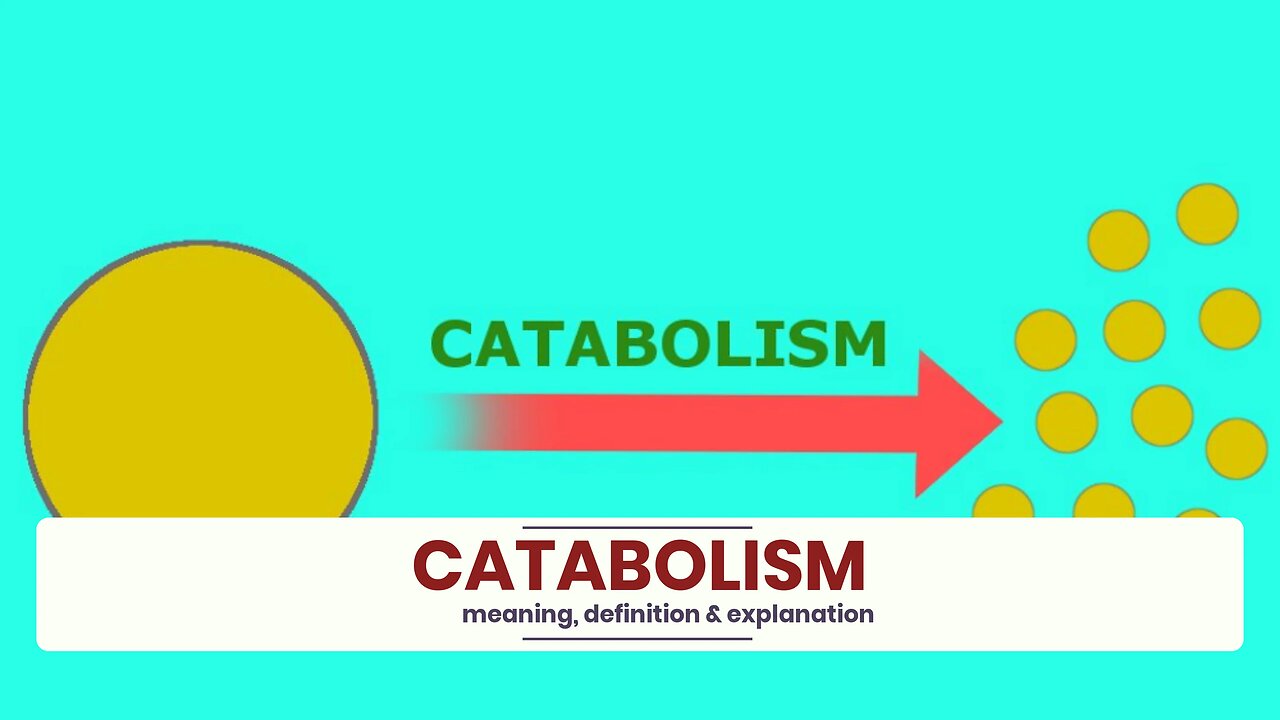Premium Only Content

What is CATABOLISM?
✪✪✪✪✪
http://www.theaudiopedia.com
✪✪✪✪✪
What does CATABOLISM mean? CATABOLISM meaning - CATABOLISM definition - CATABOLISM explanation. What is the meaning of CATABOLISM? What is the definition of CATABOLISM? What does CATABOLISM stand for? What is CATABOLISM meaning? What is CATABOLISM definition?
Catabolism is the set of metabolic pathways that breaks down molecules into smaller units that are either oxidized to release energy, or used in other anabolic reactions. Catabolism breaks down large molecules (such as polysaccharides, lipids, nucleic acids and proteins) into smaller units (such as monosaccharides, fatty acids, nucleotides, and amino acids, respectively).
Cells use the monomers released from breaking down polymers to either construct new polymer molecules, or degrade the monomers further to simple waste products, releasing energy. Cellular wastes include lactic acid, acetic acid, carbon dioxide, ammonia, and urea. The creation of these wastes is usually an oxidation process involving a release of chemical free energy, some of which is lost as heat, but the rest of which is used to drive the synthesis of adenosine triphosphate (ATP). This molecule acts as a way for the cell to transfer the energy released by catabolism to the energy-requiring reactions that make up anabolism. (Catabolism is seen as destructive metabolism and anabolism as constructive metabolism). Catabolism therefore provides the chemical energy necessary for the maintenance and growth of cells. Examples of catabolic processes include glycolysis, the citric acid cycle, the breakdown of muscle protein in order to use amino acids as substrates for gluconeogenesis, the breakdown of fat in adipose tissue to fatty acids, and oxidative deamination of neurotransmitters by monoamine oxidase.
There are many signals that control catabolism. Most of the known signals are hormones and the molecules involved in metabolism itself. Endocrinologists have traditionally classified many of the hormones as anabolic or catabolic, depending on which part of metabolism they stimulate. The so-called classic catabolic hormones known since the early 20th century are cortisol, glucagon, and adrenaline (and other catecholamines). In recent decades, many more hormones with at least some catabolic effects have been discovered, including cytokines, orexin (also known as hypocretin), and melatonin.
Many of these catabolic hormones express an anti-catabolic effect in muscle tissue. One study found that the administration of epinephrine (adrenaline) had an anti-proteolytic effect, and in fact suppressed catabolism rather than promoted it. Another study found that catecholamines in general (the main ones being, epinephrine, norepinephrine and dopamine), greatly decreased the rate of muscle catabolism.
-
 2:28
2:28
The Audiopedia
1 year agoWhat is MORTGAGE BROKER?
27 -
 LIVE
LIVE
Sean Unpaved
2 hours agoBrian Kelly's Boot From LSU, NFL Week 8 Snoozefest, & CFB's Week 9 Upset Rodeo
141 watching -
 1:03:58
1:03:58
Timcast
2 hours agoTrump DEPLOYS Election Monitors To Blue States, Democrats SCREAM RIGGED ELECTION
133K70 -
 2:07:27
2:07:27
Steven Crowder
4 hours agoWho Belongs: What the Future of the American Right Wing Looks Like
292K191 -
 1:29:28
1:29:28
NAG Podcast
20 hours agoSay Something Beyond W/MikeMac: DARKSIDE - Ep.11
181 -
 35:24
35:24
The Rubin Report
3 hours ago'Real Time' Crowd Goes Quiet as Bill Maher & Democrat Have a Tense Exchange About Zohran Mamdani
83.2K38 -
 LIVE
LIVE
Rebel News
1 hour agoTrump says he can play dirty, Canada-US trade talks off, BC to launch anti-tariff ad | Rebel Roundup
482 watching -
 2:26:58
2:26:58
Nikko Ortiz
3 hours agoValid Crashout's... |Rumble Live
4.28K1 -
 LIVE
LIVE
LFA TV
17 hours agoLIVE & BREAKING NEWS! | MONDAY 10/27/25
2,434 watching -
 LIVE
LIVE
StoneMountain64
1 hour agoBattlefield 6 Season 1 TOMORROW. Battle Royale? New Map + New Weapons!
120 watching